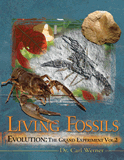Living With Your Ancestors
BBC NEWS: “Finds test human origins theory”
Evolutionists are busy rewriting the story of the evolution of humankind, reports the BBC’s James Urquhart. Two hominid fossils from Kenya have prompted the revisions, which entail a new hypothesized evolutionary relationship between Homo habilis and Homo erectus, as claimed in the journal Nature.
The broken maxilla was dated to approximately 1.44 million years ago.
Until these recent revelations, Homo habilis was believed by evolutionists to have been the direct predecessor of Homo erectus; the latter was also considered the immediate predecessor of Homo sapiens. The latest evolutionary speculation, however, is that Homo habilis and Homo erectus were “sister species that overlapped in time” rather than successive members of the hominid sequence.
At the center of this revised account of human evolutionary history is what has been labeled the youngest specimen of Homo habilis ever found—or, to be more precise, a jawbone found in Kenya and “attributed to Homo habilis because of its distinctive primitive dental characteristics.” The broken maxilla was dated to approximately 1.44 million years ago.
Meanwhile, evolutionists have assigned to the Homo erectus category a skull comparable in size to those of Homo habilis. The BBC explains that, despite its diminutiveness, the skull belongs in the Homo erectus category because it “displayed typical features of erectus such as a gentle ridge called a ‘keel’ running over the top of the jaw joint.” Scientists dated the skull to 1.55 million years old.
Of course, 1.55 million years is a bit larger than 1.44 million years, and thus, based on their own old-earth dating techniques—dating techniques that are as much assumption and convenience as science—these scientists were forced to acknowledge an overlap between Homo habilis and Homo erectus. This overlap, of course, severely (though not completely) undermines the hypothesis that the latter evolved from the former.
Why not “completely”? Fred Spoor, a University College London professor of developmental biology and coauthor of the Nature paper, throws out one hypothesis:
“It’s always possible that Homo habilis lived, let’s say, 2.5 million years ago and then in another part of Africa, away from the Turkana basin, an isolated population evolved into Homo erectus. [...] But that is a much more complex proposition,” Professor Spoor explained, “the easiest way to interpret these fossils is that there was an ancestral species that gave rise to both of them somewhere between two and three million years ago.”
So, in other words, the “easiest” way to interpret the discovery is that the story of human evolution as presented in books, museums, and classrooms for decades is wrong according to evolutionists themselves! The question is, then, after such reversals, does the ordinary individual view with any greater skepticism evolutionists’ stock teaching? For example, after this complete reversal, how much faith will people place in this evolutionary assurance:
Does the ordinary individual view with any greater skepticism evolutionists’ stock teaching?
The fossil record indicates that modern humans (Homo sapiens) evolved from Homo erectus.
Sadly, it seems that even these substantial revisions in the evolutionary story are quickly recast as the irrefutable, unchallengeable “facts” to be presented in books, museums, and classrooms. In fact, the AP version of the story strives to allay fears that these continual upheavals undermine the tale of human evolution:
Susan Anton, a New York University anthropologist and co-author of the Leakey work, said she expects anti-evolution proponents to seize on the new research, but said it would be a mistake to try to use the new work to show flaws in evolution theory.
“This is not questioning the idea at all of evolution; it is refining some of the specific points,” Anton said. “This is a great example of what science does and religion doesn't do. It’s a continous self-testing process.”
It seems amazing that the authors of the work have to tell the reader how to interpret and not interpret their results; it’s as if they are saying, “Because we are obviously smarter than you, you can only see these results the way we want you to.” Furthermore, if evolutionary science is truly “self-testing,” then why is evolution itself somehow beyond this testing? The more evidence comes to light that the story of evolution is—just that—a story, the more evolutionists do everything but test the theory. Anton is right in one regard, however. Historical science is not like religion (especially materialism masquerading as historical science): historical science that excludes God depends upon the limited, fallible understanding of humans, whereas biblical Christianity depends upon the accurate, reliable, eye-witness account given by the One who was actually there.
Remember, if you see a news story that might merit some attention, let us know about it! (Note: if the story originates from the Associated Press, Fox News, MSNBC, the New York Times, or another major national media outlet, we will most likely have already heard about it.) And thanks to all of our readers who have submitted great news tips to us.
(Please note that links will take you directly to the source. Answers in Genesis is not responsible for content on the websites to which we refer. For more information, please see our Privacy Policy.)
Recommended Resources

Answers in Genesis is an apologetics ministry, dedicated to helping Christians defend their faith and proclaim the good news of Jesus Christ.
- Customer Service 800.778.3390
- © 2024 Answers in Genesis



